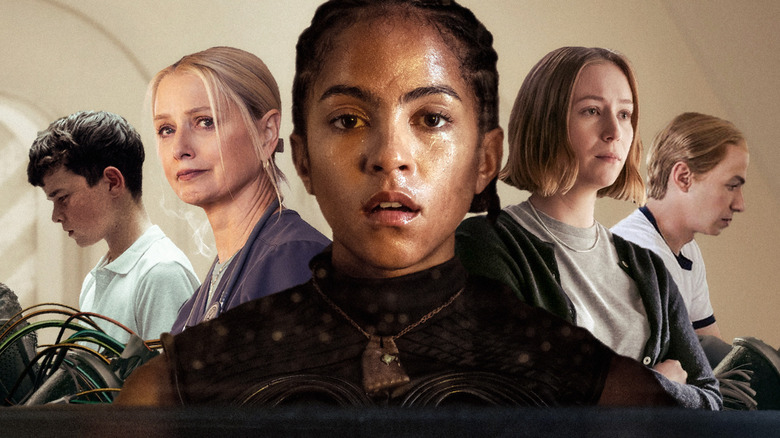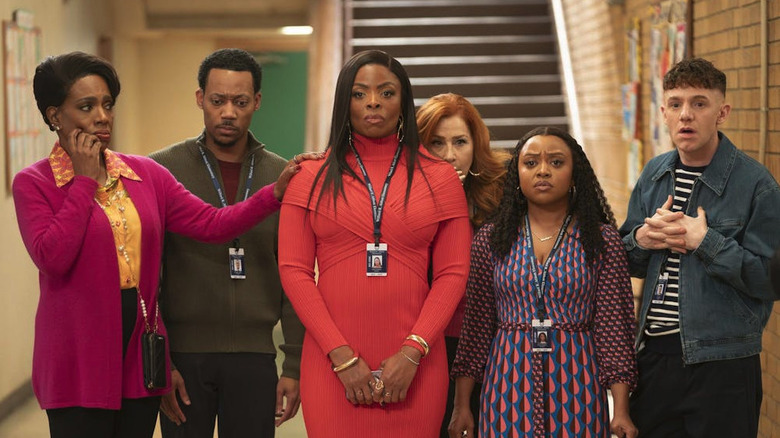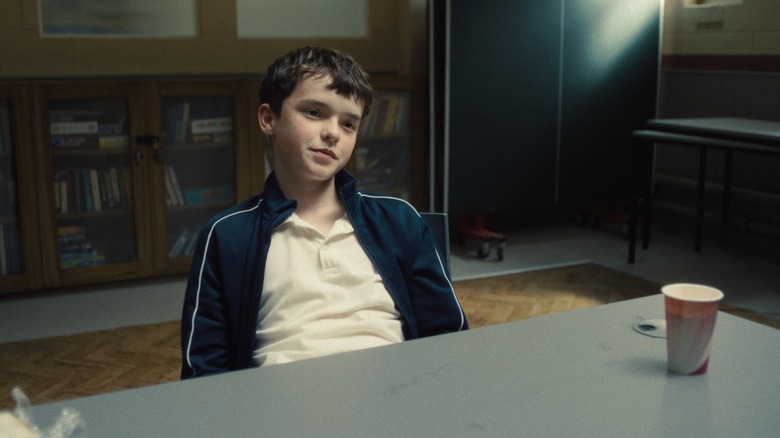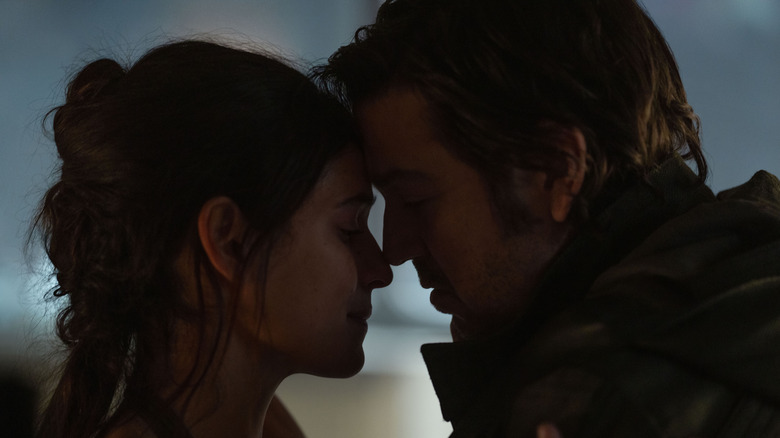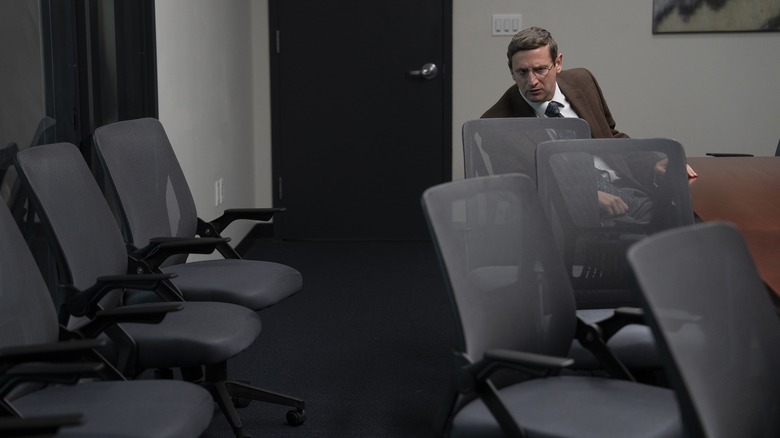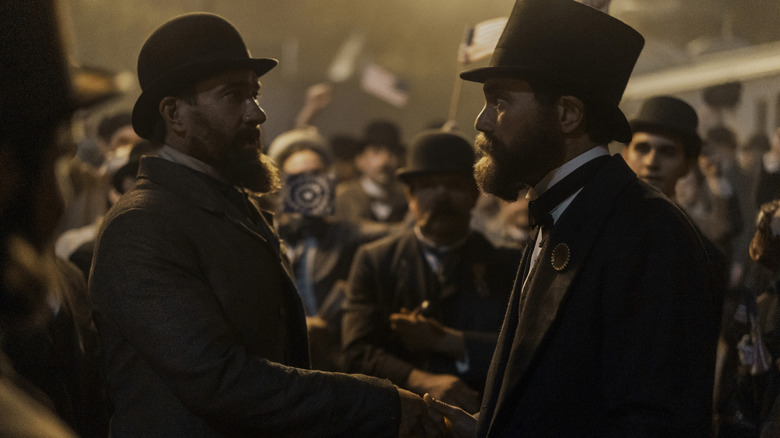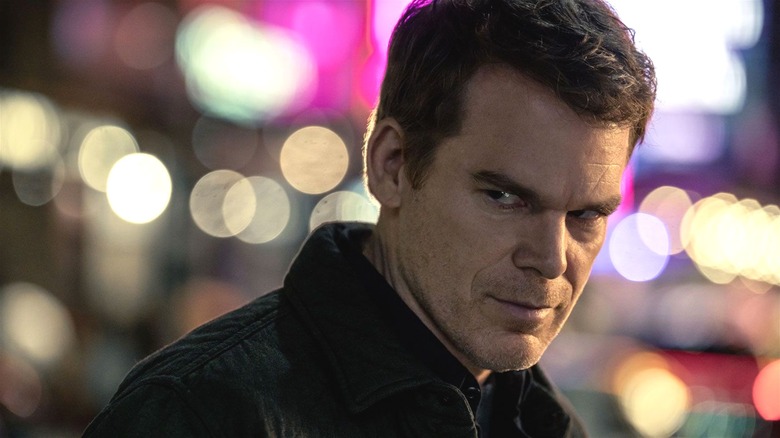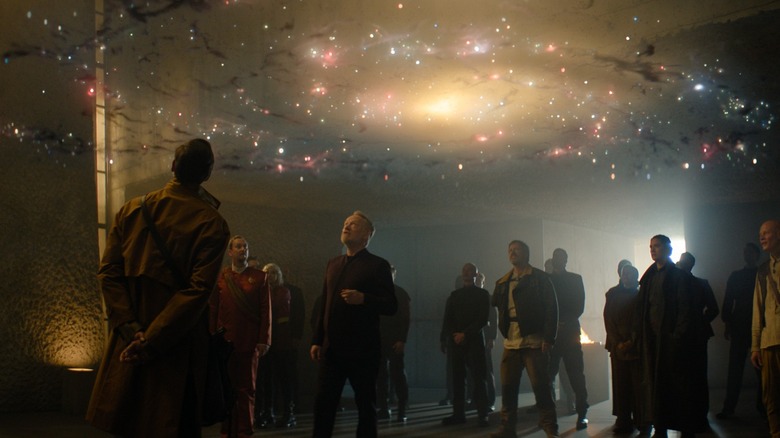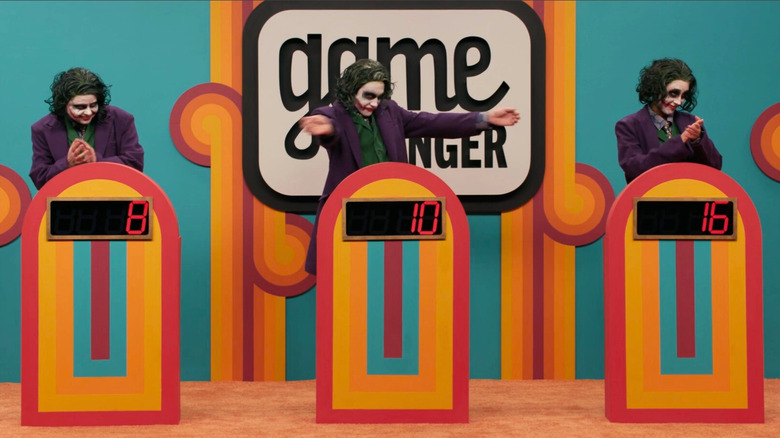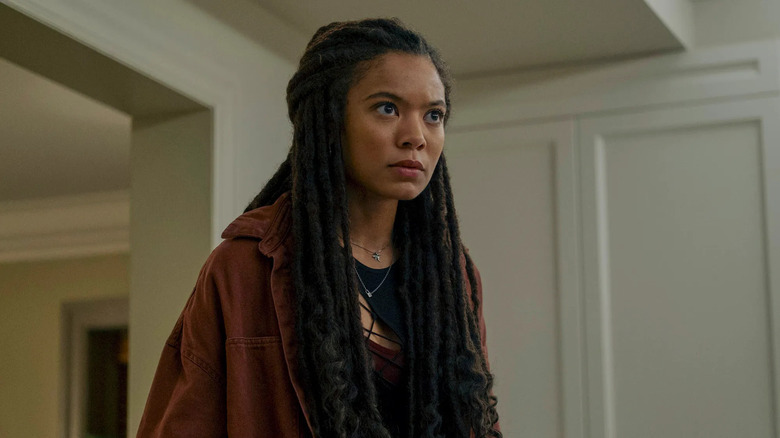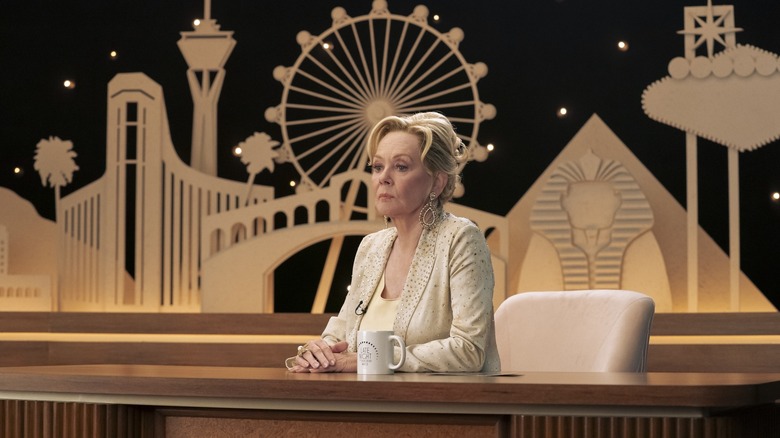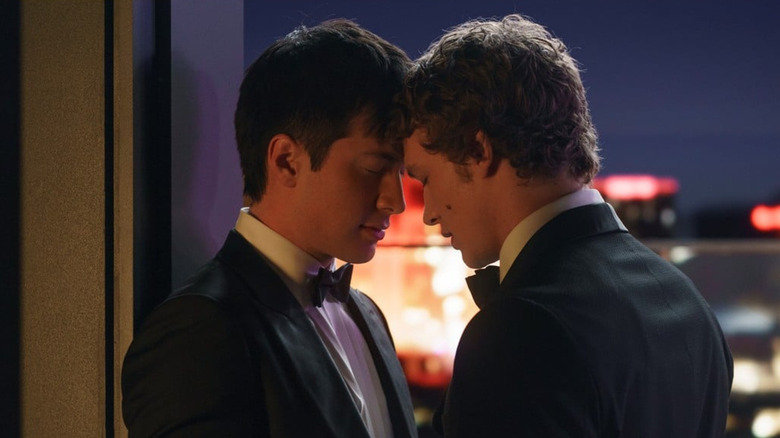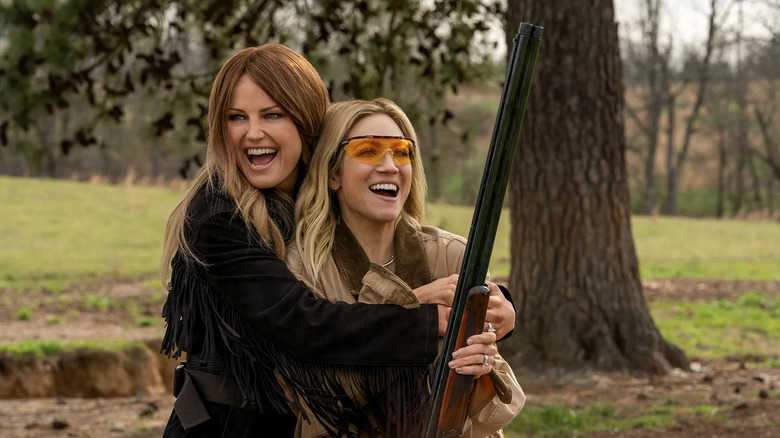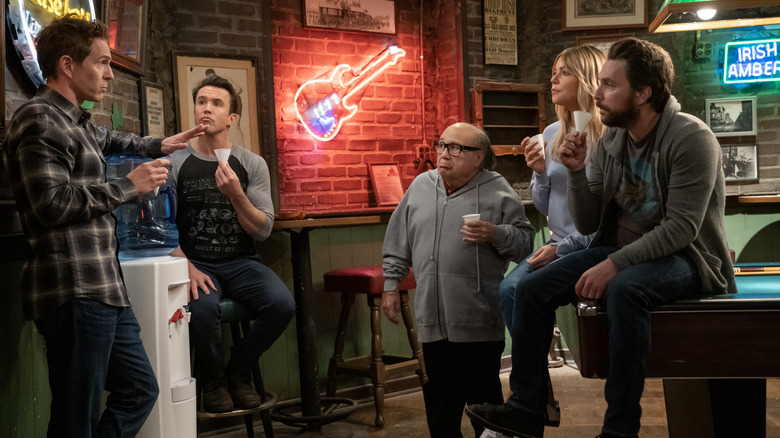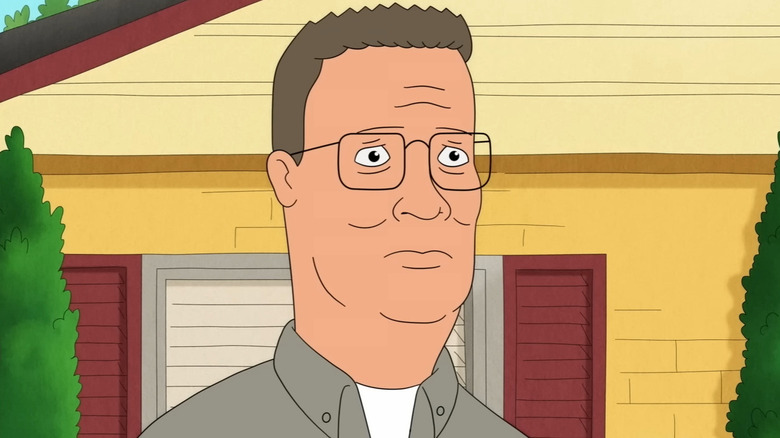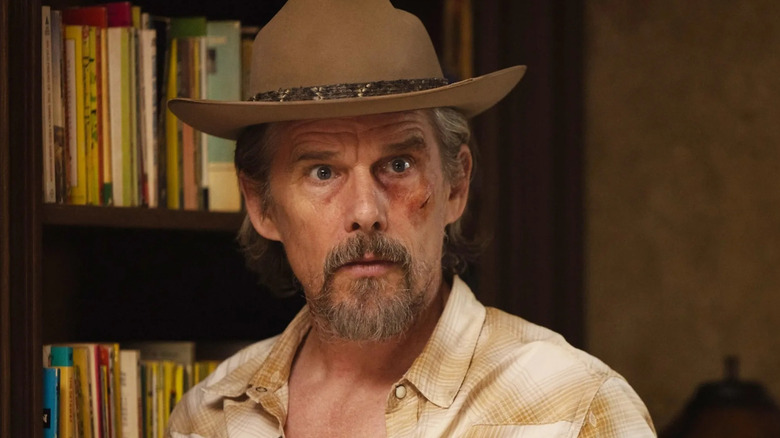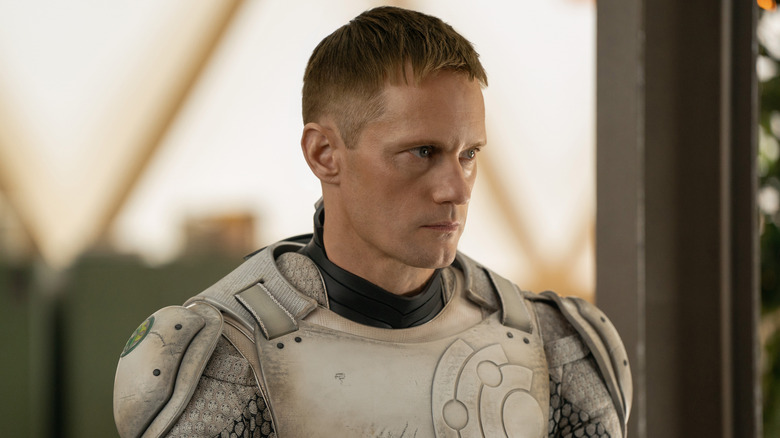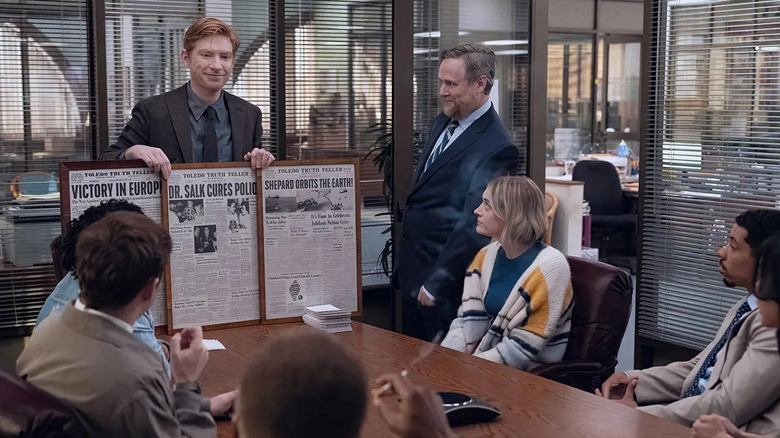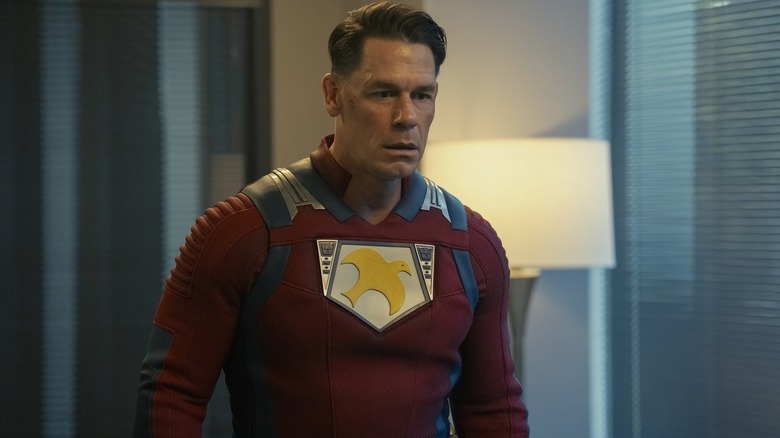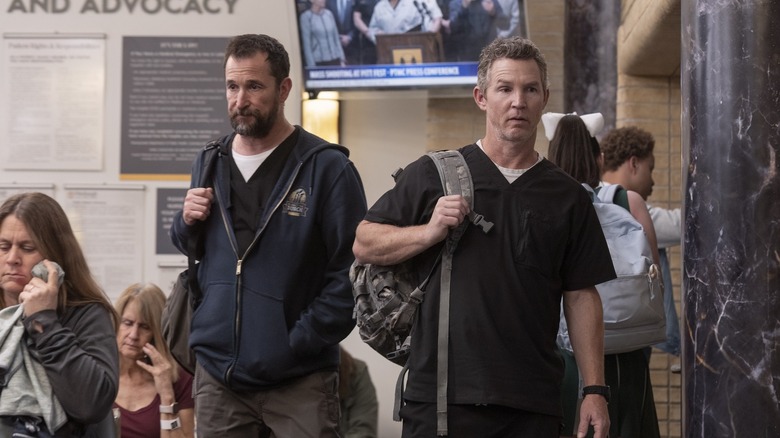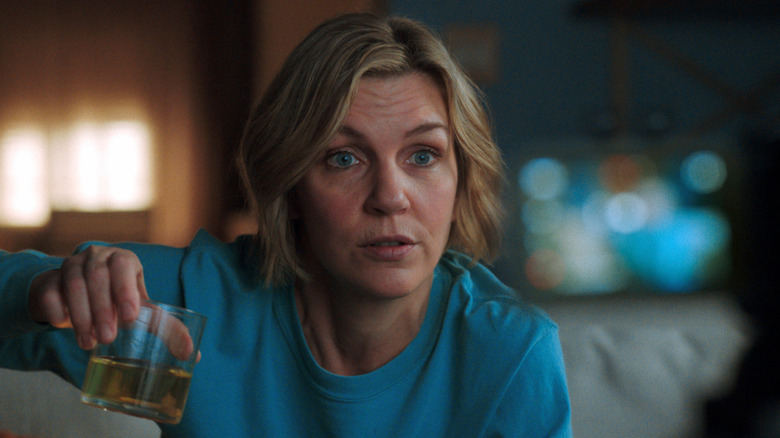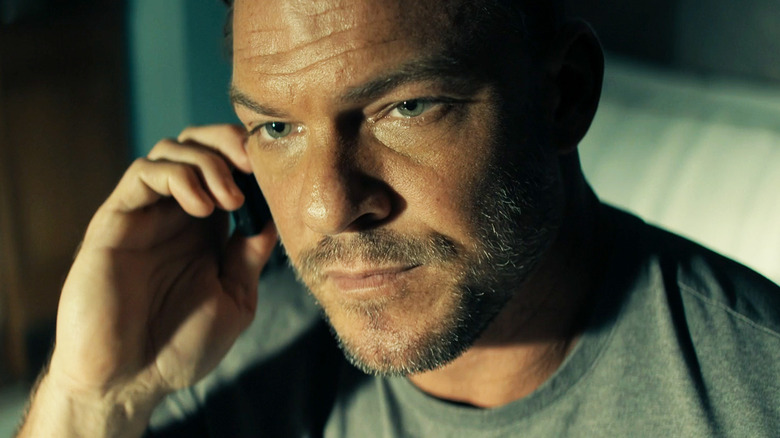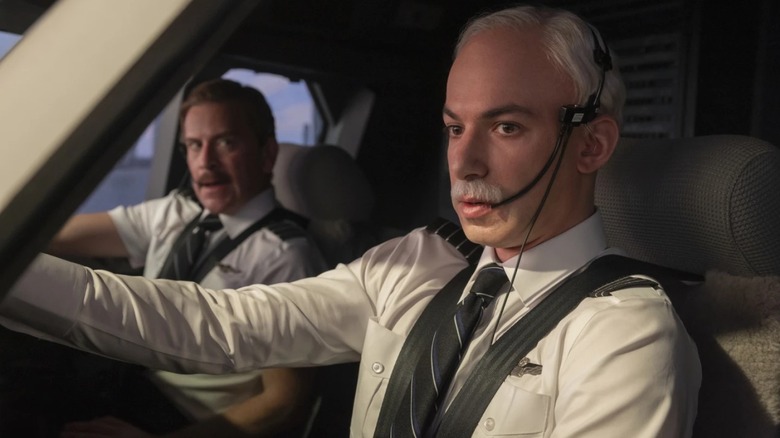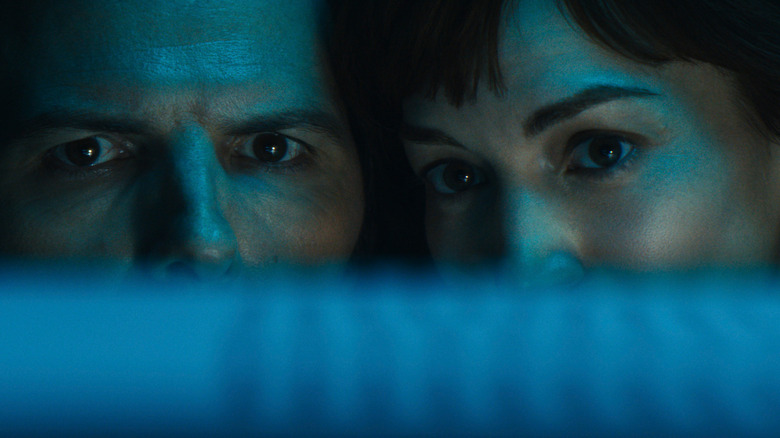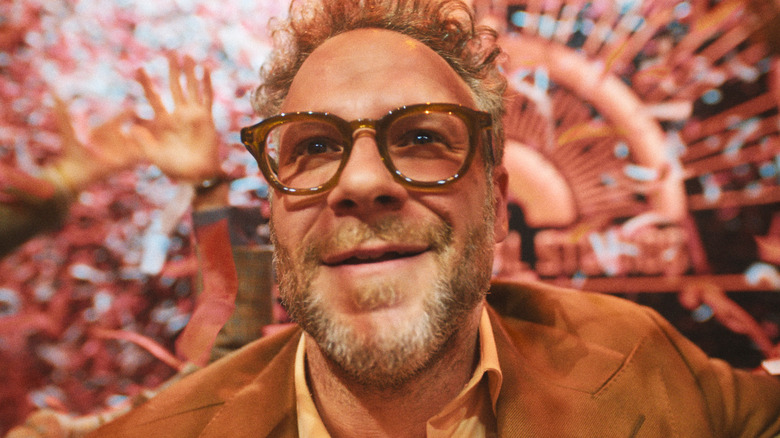24 Best TV Shows Of 2025
Contrary to what certain awards-giving organizations would have you believe, there were more than five great TV series in 2025. Not only that, but it's remarkable just how different the best shows of the year were. Some of them were sitcoms closing in on the legal drinking age, while others were wildly ambitious sci-fi series that put every penny of their massive budgets on-screen. No two were even remotely alike, either, be they about comic book superheroes, the experiences of people who spend their days working in cubicles, or even today's youth. Just as noteworthy are the continuations or revivals of much-older shows that proved shockingly relevant in the modern world, animated and live-action alike. And, of course, some of these series were just an utter trip, so much so that it's easy to overlook how clever and witty they truly were.
Enough jabbering, though, let's get to the goods. Here are /Film's picks for the best TV shows of 2025 (in alphabetical order).
Abbott Elementary
"Abbott Elementary" has already proven to be one of the few great comedies to come out of network television in recent years. The fact that it shows no signs of slowing down in its fourth season is a testament to how good the ABC series' writing staff is at depicting the hilarious trials and tribulations of a public school in Philadelphia.
This season included some surprising developments that helped make it another stellar round of episodes. First and foremost, the firing of Ava Coleman (Janelle James) as Abbott's principal was quite the shake-up towards the end of the season. Watching Ava step up to not only help the rest of the schools in her community but also selflessly take the blame in order to spare her colleagues from being punished for their dealings with the nearby golf course was a lovely development for the typically selfish character.
Meanwhile, despite Janine (Quinta Brunson) and Gregory (Tyler James Williams) having made their romance official, they had some delightfully entertaining hurdles to overcome as a couple, such as having far too specific of a Halloween couples costume, spending their first Christmas together, and Gregory telling Janine that he loves her. They just get more and more adorable as the show goes on.
Besides that, the rest of the outstanding "Abbott Elementary" ensemble is still as reliable and funny as ever, and they even got help from a crossover with "It's Always Sunny in Philadelphia," which was another highlight this season. Here's to hoping the show can keep this momentum going as it heads into season 5. (Ethan Anderton)
Adolescence
If you haven't seen it, there's still time to watch "Adolescence" before the year ends and you realize that yes, it really is that good. Co-created and written by Jack Thorne and Stephen Graham, the show deals with a 13-year-old boy named Jamie Miller (Owen Cooper) murdering a classmate and the fallout for those connected to the incident, including Jamie's father, Eddie (Graham).
Any basic murder tale can end with the killer being caught, but "Adolescence" tells a different story, shedding light on a much more serious issue. Once it's made clear what Jamie has done, the show ventures into fascinating directions as it explores why this happened, with each new piece of the puzzle fitting together to deliver another emotional punch. As for the series' much-talked-about technical aspects, its single-take episodes aren't a gimmick. Instead, they're weaponized to grant viewers the same amount of breathing space that the show's characters — as portrayed by an incredible cast that also includes Cooper and Graham's fellow Emmy-winner Erin Doherty — have as they try to figure out how a good egg went so terribly bad.
It's here where the most remarkable thing "Adolescence" has going for it presents itself. This show doesn't point fingers; instead, it serves as a cautionary tale about the ways young minds can absorb a toxic message and pay a steep price for it. It's what sets the series apart from many shows on this list, because while all of them might make excellent viewing, only a few of them are equally essential. (Nick Staniforth)
Andor
I should confess my bias here: I have never loved a season of television, a film, or hardly anything else the way I loved "Andor" season 1. It was the perfectly tailored gift for a kid who grew up on the "Star Wars" franchise and came of age watching the "Bourne" movies scripted by "Andor" creator Tony Gilroy, with an extra dose of sophistication in its politics to elevate the whole thing beyond just being stellar genre storytelling.
"Andor" season 2 is different — larger in scale, more ambitious in topic and tone, and harder to pin down. It's also, beyond all odds, even better than the first season.
There's little to say that hasn't been said already. The production design is stunning, as are every Rebel jacket and Mon Mothma outfit, the special effects, the music, and the visual compositions. You could fill two years of award shows with just the cast of "Andor" season 2. Yes, Genevieve O'Reilly, Diego Luna, and Stellan Skarsgård all deserve the praise they've received, but every performance is terrific (looking at you, Muhannad Bhaier), and it's all made possible by a caliber of writing that somehow always balances engrossing science fiction with complex characters, levity, humor, and revolutionary politics.
But perhaps the greatest thing "Andor" season 2 does for the "Star Wars" property is bring back a core piece of George Lucas' original film trilogy that's been largely absent since then: romance. In so many ways, Adria Arjona is the star of the season as Bix Caleen, pulling off perhaps the franchise's greatest character arc across 12 episodes while simultaneously creating a pairing with Luna's Cassian Andor that makes every other "Star Wars" love story look like a warm-up round. (Rick Stevenson)
The Chair Company
I want to live in the world that's only found in Tim Robinson projects, where people matter-of-factly say objectively insane stuff like, "Morale is low. I'm going to dress up as a chicken." Fans of this offbeat comedian and Emmy winner had a very good year this year, thanks not just to his feature film "Friendship" — one of 2025's best comedies — but his HBO series "The Chair Company," which Robinson created alongside his frequent collaborator Zach Kanin. (Andrew DeYoung, who directed "Friendship," also showed up to direct a handful of episodes, sharing directing duties with "A Different Man" auteur Aaron Schimberg.)
"The Chair Company" admittedly hits beats familiar to fans of Robinson's work, like his sketch series "I Think You Should Leave" ... but that doesn't matter, because the beats are just that excellent. Robinson plays a character type we see from him often — a guy who gets embarrassed and cannot, under literally any circumstances, just take the L and move on — and this time, his Ron Trosper is humiliated when a chair breaks underneath him during an important work presentation. Devastated, Ron tries to figure out a mystery centered around the chair manufacturer, even as the situation spirals wildly out of control in ways you can't even really imagine. (Shoutout to newcomer Joseph Tudisco, who steals all his scenes as Mike Santini.) I have absolutely no idea how "The Chair Company" will pull off its forthcoming second season, but I can't wait to find out. (Nina Starner)
Death by Lightning
Right from the opening title card, "Death by Lightning" tells you exactly what it's about: "This is a true story about two men the world forgot. One was the 20th President of the United States. The other shot him." In stark contrast to most shows of this ilk, the Netflix miniseries purports to tell the story of historical events rather less well-known in pop culture at large. This isn't Hamilton dueling with Burr or the umpteenth dramatization of Lincoln's assassination (though, to be fair, Apple TV's "Manhunt" was quite enjoyable to watch), but instead an exploration into obsession, ambition, and the very real cost of doing the right thing.
Of all that "Death by Lightning" has going for it, the strength of its two main leads — both of whom share an absolute minimum of screen time together — is what carries the day. Matthew Macfadyen as the sniveling and shameless (and possibly mentally ill) office-seeker Charles Guiteau steals most every scene, knowing exactly what tone to pitch his outsized performance to and never going too far over the top. But don't sleep on the quiet air of confidence and strength that Michael Shannon embodies as Andrew Garfield. Thrust into a Presidential race against his will (which only convinces everyone even more of his fitfulness to run), Shannon brings out all the pathos and sense of doom one would expect from a figure like this. The destination may be inevitable, but the journey proves well worth the effort. (Jeremy Mathai)
Dexter: Resurrection
Any reactions of knee-jerk cynicism to a franchise revival like "Dexter: Resurrection" are understandable. After all, the morbid fascination that a show like "Dexter" evoked has faded over time, and subsequent attempts to resuscitate its legacy — mainly via "New Blood" and "Original Sin" — have felt redundant. But "Resurrection" manages to do something its predecessors couldn't: It comes very, very close to capturing the dark thrill of the original series, replete with the pulpy gimmicks that make the titular serial killer so compelling. Dexter (Michael C. Hall) doesn't seem to be the focus at first, as his now-adult son Harrison (Jack Alcott) has followed in his father's footsteps and now has to contend with his twisted family legacy. But Dexter soon returns to his old ways, publicly earning him the Dark Passenger moniker that he had always embraced in his heart of hearts.
What's more, "Resurrection" boasts an impressive guest-star roster (Uma Thurman! Peter Dinklage! David Dastmalchian!) throughout its first 10 episodes, which adds to the excitement of a fresh but familiar revival. The show's gore also takes things up a notch, with crime scenes that will continue to haunt you long after they've been scrubbed clean. Last, but not least, there's something hypnotic about Hall slipping back into the shoes of a killer with a complex sense of morality, as he elevates even the most questionable moments with his astounding performance. And oh, if you've missed Dexter's internal monologues, "Resurrection" will help scratch that itch and much more. (Debopriyaa Dutta)
Foundation
In 1951, Isaac Asimov gifted the world the first book in the "Foundation" series. The last novel wasn't published until 1993, after Asimov's death. Why mention this? Well, when you look at all the "Foundation" books, which were printed and written over a lifetime, they are ridiculously complicated, nuanced, and inconsistent. Some novels jump 50 years in a single chapter. Others take a whole book to get through a few months of the story.
My point? Adapting this property with even a remote degree of success — let alone creating a genuinely popular show — is one of the most impressive things I've ever seen as a journalist. And yet, David S. Goyer (who's since stepped down as showrunner) and company have done just that over three seasons now for Apple TV+.
The best part? After two seasons of setup, season 3 takes things to the next level as the Empire crumbles and the Foundation faces new, seemingly insurmountable dangers. Despite the adaptive challenges, the season ties into the books all over the place, especially in two areas: the mentalic-powered Second Foundation and the menacing, misunderstood villain known as the Mule. Goyer and his team deftly shepherd these ridiculously complicated sci-fi elements into the latest season, keeping viewers simultaneously educated in the ways of Asimovian sci-fi and on the edge of their seats. Goyer's departure makes me nervous for season 4, but for now, let's revel in one of the best seasons of television in 2025. (Jaron Pak)
Game Changer
There is nothing, and I mean nothing, like the Dropout game show "Game Changer." No other show on television would stage a fake "presidential debate," only to trot out former United States Secretary of Labor Robert Reich and make the candidates fight over his "endorsement." No other show would dress three comedians up as the Joker and challenge them to completely, and earnestly, perform a choreographed dance set to Seal's "Kiss From a Rose." No other show would stock a roulette wheel full of rules like "without showing teeth" and "doing your worst Robert De Niro impression," and no other show would give contestants a challenge one year prior and ask them to return to show their work after 365 days. "Game Changer," spearheaded by Sam Reich and Dropout stalwart Brennan Lee Mulligan, is truly special, and by special, I do mean gut-bustingly funny. (During that roulette wheel episode, aptly titled "Rulette," I kept having to hit pause because I was laughing so hard that I thought I might be sick.)
I do need to say here that my esteemed /Film colleague BJ Colangelo is the queen of all things "Dropout" 'round these here parts, and I am merely a court jester who was given the opportunity to talk about why I love this show so very, very much. Every other Monday night at 7 PM, I've been glued to my TV waiting for the latest episode to drop, and in between hysterically laughing, I've found myself getting emotional ... especially when an entire "Who Wants to Be a Millionaire?" spoof sponsored by LinkedIn turns out to be an episode dedicated to bettering one cast member's life. (Nina Starner)
Gen V
Season 2 of Prime Video's "Gen V" faced steep odds. As both a spin-off of "The Boys" and a sequel to its own cliffhanger ending, the series had to juggle continuing storylines, superhero fatigue, and the evergreen uphill battle of being a show about young adults. On top of that, the tragic death of cast member Chance Perdomo added a heavy emotional and creative challenge, forcing the show to rewrite major arcs midstream.
Even with these hurdles, "Gen V" returns with a sharpened focus. The series retains all the expected trademarks of the "The Boys" universe: over-the-top violence, sexually charged situations, and biting political satire that pulls straight from the headlines — or, more accurately, from your latest doomscroll. Hamish Linklater also joins the cast as the insidious Cipher, an immediate standout as an all-time great TV villain.
But what sets this season apart is its emotional core. The absence of Perdomo's character, Andre Anderson, is woven into the narrative in a way that deepens the stakes for the remaining characters. Thanks to showrunners Michele Fazekas and Tara Butters and their team's smart narrative pivots, the series gains a surprising amount of heart. Amid the chaos and carnage, a dose of sincerity makes "Gen V" feel more grounded and more compelling than ever. (BJ Colangelo)
Hacks
The HBO Max dark comedy series "Hacks" almost feels like a miracle, with each new season somehow even better than the last. The biting comedy follows aging comedian Deborah Vance (Jean Smart) as she tries to revive her career by hiring young writer Ava (Hannah Einbinder) to help her connect to younger audiences. Over the first three seasons, Deborah and Ava put each other through hell and back, with a relationship that's as creatively powerful as it is tumultuous. Both Smart and Einbinder are giving the performances of a lifetime, and it's incredible to see their comedic chemistry at work (even when Deborah and Ava are at one another's throats).
The fourth season of "Hacks" sees Deborah finally achieving her dream of hosting her own late night show, and while there are plenty of perks, it's also a total nightmare in its own way. (In fact, former late night host Conan O'Brien joked that the series gave him "PTSD" because it was so accurate to the stresses of late night.) In addition to the funny and fierce Smart and Einbinder, the show also features great turns from Megan Statler, Kaitlin Olson, and series co-creator Paul W. Downs, along with a number of killer guest stars like Seth Rogen as himself and comedian Lauren Weedman as the absolutely bizarro mayor of Las Vegas. "Hacks" is one of the best shows about show business ever made, and its stellar fourth season makes it a 2025 standout. (Danielle Ryan)
Heated Rivalry
If you've heard rumblings about "the gay hockey show," this is the show, and the rumblings are well-deserved. Released on HBO Max in the US, "Heated Rivalry" hails from Crave in Canada (thank you, Canada) and is based on author Rachel Reid's hockey romance novels of the same name. The premise is pretty straightforward: professional hockey's two hottest stars form a legendary rivalry on the ice, while secretly falling into a heated romance behind the scenes. It's a heated rivalry!
"Heated Rivalry" has everything: forbidden love, homoerotic hydration, racy sex scenes, and — occasionally — hockey. It also had a huge amount of potential to be cringe, which is why it's so impressive that it's not. Much of the credit is owed to stars Hudson Williams (as Canada's native son Shane Hollander) and Connor Storrie (as Russian transplant Ilya Rozanov), whose screen chemistry is electric whether they're being playful or passionate. But "Heated Rivalry" succeeds as a drama even beyond its central couple, finding a balance between steamy romance and sincere engagement with the real-world pressures that keep queer athletes in the closet.
Whether you're watching it for the plot or "for the plot," "Heated Rivalry" is intensely watchable. This is one of the hottest shows of 2025 in more ways than one. (Hannah Shaw-Williams)
The Hunting Wives
The Netflix hit "The Hunting Wives" sounds like the title of a show birthed from a "30 Rock" joke, but the series adaptation of May Cobb's popular novel of the same name is a hoot and a half. Created by Rebecca Cutter and originally produced for Starz before being acquired by Netflix, "The Hunting Wives" teases viewers into thinking this is a story about a blue-state woman named Sophie (Brittany Snow) struggling to adjust to the social circles of her new red-state home, but things become complicated when a teen girl winds up dead, and Sophie is seemingly framed for the murder.
Yeah, sure, this sounds like a season plotline of "Desperate Housewives" or "Big Little Lies," but what made "The Hunting Wives" such an addictive sensation is that it's also a show about disastrous queer women who are harboring their secret lives from their community, husbands, and each other. It's a twisty, titillating, and totally tense series, but with a tongue planted firmly in cheek the entire time. For example, despite viewers knowing that "cheating on your partner is bad," the show presents all of the husbands as such irritating losers that we can't help but cheer when the wives cheat on their husbands with one another. Snow delivers one of the best performances of her career as Sophie, but "The Hunting Wives" would fall apart without the all-time-great leading turn by Malin Åkerman as the Queen Bee of Socialites with Secrets, Margo Banks. Be careful hitting play, because you might wind up watching all eight episodes in a single sitting (BJ Colangelo)
It's Always Sunny in Philadelphia
The long-running FX comedy "It's Always Sunny in Philadelphia" marked its 20th anniversary in 2025, celebrating with a season that was one of its best in years. Frank (Danny DeVito), Dennis (Glenn Howerton), Mac (Rob Mac), Dee (Kaitlin Olson), and Charlie (Charlie Day), better known as "the gang," have always been up to no good, but in season 17, they got up to some of their most ridiculous antics yet. This was the season of Frank in particular, with DeVito's father figure getting one over on the rest of the gang multiple times through high concept cake fake-outs, some seriously disturbing lies at the dog track, and even by appearing on "The Golden Bachelor." The rest of the gang do their best to keep up and mostly just find themselves falling for Frank's various schemes — something that's held true throughout the series but got turned up to 11 for this most recent season.
FX renewed "It's Always Sunny" through season 18 back in 2020, but whether or not the next season will be the final one for the gang is anyone's guess at this stage. Thankfully, if season 17 is the penultimate outing for the Philly-based comedy, it's one of its strongest and hopefully means that it'll go out on a high note. Just let Dennis do the singing. (Danielle Ryan)
King of the Hill
One word immediately comes to mind when describing Mike Judge's "King of the Hill" revival: Yep. 15 years is a long time for any show to be off the air, but "King of the Hill" season 14 is the television equivalent of catching up with old friends and feeling like no time has passed, even though it has — in a big way. In this instance, Hank and Peggy have returned to Texas after spending years working in Saudi Arabia, and Bobby is all grown up. Sure, this is still the same "King of the Hill" we all know and love, only tailored for modern times — and it's great.
The highlight — and central theme — of "King of the Hill" season 14 is watching Hank and his family react to contemporary times. As expected, Hank is confused by some aspects of American modernity, as he opposes hi-tech barbecue grills and gets into disagreements with woke college students over trucks. Yet, the revival doesn't set out to inflame culture war debates or take a particular stance. In true "King of the Hill" fashion, the humor is delightfully mundane, observational, and topical. The biggest surprise, though? Hank loves soccer now.
"King of the Hill" was gone long enough to make us miss it, but the revival proves that the show can be relevant and funny in the current pop culture landscape for years to come. The good news for fans is that more new episodes are reportedly coming to Hulu, so viewers can potentially expect more hilarity from the Hill family and their zany neighbors. (Kieran Fisher)
The Lowdown
Nobody should be surprised when Ethan Hawke turns in a great performance, but as fictional writer Lee Raybon on the FX and Hulu series "The Lowdown" (who's based on the real-life writer Lee Roy Chapman), Hawke is at the top of his game as a shifty, sweaty, and squirrelly bookseller and "truthstorian" operating out of Tulsa, Oklahoma. After he writes a scathing exposé of Tulsa's wealthiest family, the Washbergs, one of their own, Dale (an always welcome Tim Blake Nelson) dies by suicide and leaves behind a cryptic note that Lee happens to uncover in one of the man's old books. From there, Lee is swept up in some seriously dangerous local intrigue, even as he tries to keep his friends and family, especially his daughter Francis (Ryan Kiera Armstrong), safe.
Hawke is excellent on "The Lowdown," and he's not alone; luminaries like Keith David, Kyle MacLachlan, Tracy Letts, Michael Hitchcock, and Jeanne Tripplehorn join him on the series, just to name a few of his cohorts. Plus, if you're still missing "Reservation Dogs," this series is overseen by that show's creator Sterlin Harjo, proving that this showrunner is one of the most individual and uniquely minded creatives working on the small screen today. (Nina Starner)
Murderbot
Based on Martha Wells' "The Murderbot Diaries" novel series, the Apple TV+ sci-fi comedy-drama "Murderbot" ... well, rules. Happily unserious about its interstellar capitalist dystopia, the show unfolds around the titular, socially awkward, and secretly autonomous Sec-Bot unit (Alexander Skarsgård), which loves cheesy space operas and treats everything else with detached cynicism. It's one of those series that live and die with its casting. Fortunately, Skarsgård embraces the chance to get truly weird.
The actor plays Murderbot as a cross between Robocop and an awkward human nerd with zero social skills; it's utterly fearless when it's time to tackle an alien beast or a more powerful robot, but it breaks in metaphorical cold sweat whenever it needs to interact with human beings. Murderbot is also an extremely talented narrator, offering acidic commentary that elevates even the most cookie-cutter moments.
Inserted in a solid sci-fi mystery plot and surrounded by a cast of capable performers like Noma Dumezweni and David Dastmalchian, Murderbot is a solid, captivating protagonist. It's easy to envision it pulling a "Reacher" and carrying on season after season of reluctant adventures with a brand new supporting cast — and with "Murderbot" season 2 on the way, it seems that the show is indeed heading in that direction. And honestly? Bring it. (Pauli Poisuo)
The Paper
"The Office" wasn't the most popular show on Earth when it aired. After a few years being binged on streaming platforms, though, it rose to become one of the most iconic television experiences of the 20th-century. We're talking about the kind of stuff that redefines entertainment and sets gold standards.
The thought that any show could match its heartfelt comedic prowess seemed impossible. And you know what? Its spin-off series, "The Paper," doesn't even come close. Not yet, at least. But that doesn't mean it's bad. On the contrary, one of the biggest accomplishments of Peacock's office-themed mockumentary sitcom is that it actually delivers the goods. Moreover, it didn't have to outshine "The Office" to thrive.
All "The Paper" had to do was survive the inevitable scrutiny and criticism that would come from any series set in the "Office" universe, and on that count, it worked. The show's Ned Sampson (Domhnall Gleeson) is a perfect boss in the sense that he doesn't try to channel, mirror, or compete with the legacy of Michael Scott at all. Esmeralda Grand (Sabrina Impacciatore) is similarly perfect as the series' quirky, Dwight Schrute-esque character without needing to be anything like him. Really, in general, "The Paper" isn't trying to be its predecessor. Rather, it's confidently marching to the beat of its own drum — and doing a darn good job of it, too. More, please. (Jaron Pak)
Peacemaker
It seems wrong to call a show that opens its sophomore season with a graphic orgy scene, the gory death of a key character, and two notable DC Universe superheroes utterly disrespecting the protagonist tender, but that's really the only way to accurately describe the beating, wounded heart of "Peacemaker." From the very first moment, it's clear that James Gunn's recent focus on "Superman" and his duties running the DCU have taken away none of his affection for the 11th Street Kids. On the contrary, "Peacemaker" season 2 is a labor of love that takes the first season's unique combination of introspection and vulgarity and fine-tunes it into an unstoppable multiversal vehicle that fully justifies the show's existence in the new DCU. The new opening credits dance sequence is aces, too.
Gunn projects rarely have weak acting links, and "Peacemaker" season 2 is no exception. Worth a particular mention is John Cena, who plays the emotionally damaged Chris "Peacemaker" Smith with skill that continues to give Dave Bautista a run for his money as the most nuanced pro wrestler-turned-actor out there. The sheer extent of his tool kit makes me genuinely excited about Cena's Hollywood future once his ongoing WWE victory lap ends in December. Likewise, Jennifer Holland is tasked with a whole lot here as Emilia Harcourt, and she clears every hurdle with flying colors.
To say anything about the season's plot beyond the first episode would be telling: This is one series that should be experienced firsthand. If you haven't given "Peacemaker" season 2 a chance yet, please do so — you owe it to yourself. Heck, even if you've already seen it, a rewatch can hardly hurt, can it? (Pauli Poisuo)
The Pitt
The Emmys got it right during its 2025 ceremony when it officially crowned "The Pitt" as the year's best drama. Created by "ER" veterans R. Scott Gemmill, John Wells (who directed several season 1 episodes), and Noah Wyle, "The Pitt" utilizes the time-based narrative framework memorably seen in "24" where each episode is a "real-time" hour, throwing Wyle's Dr. Michael "Robby" Robinavitch into a chaotic, overcrowded, and likely understaffed emergency department in Pittsburgh for a shift that should only last for 12 hours. (It's not a spoiler to say Robby stays for 15 hours; just look at the season's episode count, and use your brain.)
Watching Wyle, who got his start on "ER" as another trauma attending Dr. John Carter, pick up a stethoscope on our TVs again would be immensely satisfying in and of itself, but also? "The Pitt" is just so, so good. Made as an ode to real healthcare workers who have suffered countless indignities since the onset of the COVID-19 crisis, the series is an unflinchingly, unfailingly realistic look at this often impossibly difficult profession ... and Wyle is obviously outstanding, but he's joined on "The Pitt" by actors who match his sheer talent, including small screen veterans Katherine LaNasa and Shawn Hatosy, as well as newcomers like Patrick Ball, Shabana Azeez, Gerran Howell, and Taylor Dearden. (Wyle, LaNasa, and Hatosy all won well-deserved Emmys for their roles.) Literally nobody on "The Pitt" is having a good day, but you'll have a good time watching it despite some of its darkest moments. (Nina Starner)
Pluribus
Vince Gilligan has delivered a show that's simultaneously the past and present of television. "Pluribus" has the episodic feel of a show made before the era of binge-watching, but understands the value of a great standalone episode of television while expertly carrying over an overarching narrative that builds from episode to episode. Rather than spend a complete season trying to solve the show's mystery of how the entire world turned into a hivemind, "Pluribus" utilizes a strategy similar to "The Leftovers." The focus is not the "how" or "why," but the "what now?"
This approach is a big part of what makes this show so special and engrossing, as it uses its dystopian setting as a tool to tell a story rather than making it the story itself. "Pluribus" would fall apart if we didn't care much about the story of perpetually miserable Carol Sturka, but Rhea Seehorn once again proves she's one of the best actors working today (and that she deserves to have multiple Emmys under her belt already) by carrying the whole show on her shoulders. It helps that "Pluribus" also looks beautiful, employing varied camera angles, long takes, and montages to serve Carol's state of mind in addition to making sure the audience is paying attention to every part of the frame. The result feels like a slap in the face of the "second screen" effect of the streaming age, and one of the year's best shows. (Rafael Motamayor)
Reacher
"Reacher" has been a ton of pulpy fun since its first season debuted back in 2022. But season 3 delivered the best installment yet, doubling down on everything that makes this ridiculous show so thoroughly enjoyable while also adding new elements that worked surprisingly well. Muscly dude punching people? Check. Over-the-top action sequences? Check. Jack Reacher constantly outsmarting everyone around him? Check. Season 3 was "Reacher" with everything turned up to 10. But it also showcased a more subdued side to the titular character, who begins the season working undercover and skulking around a mansion in a wonderful juxtaposition of enormous man and espionage.
Of course, it helped that season 3 was based on the best Jack Reacher book, "Persuader," which is why we got arguably the best adversary Alan Ritchson's hero has yet faced in the form of Olivier Richters' unreasonably gigantic Paulie (who somehow made Ritchson look small). Waiting for the ultimate showdown between these human tanks was partly what made the season so watchable. But we also got some of the best action yet, most notably in a sequence that paid homage to the Rambo movies and saw Reacher go full guerrilla warfare in the Maine wilderness. Sonya Cassidy's Susan Duffy provided strong backup and a compelling love interest for Reacher, and we also got to see more female badassery in a memorable scene that showcased what we can expect from Maria Sten's Francis Neagley spin-off series. All of this added up to one of the most electrifying seasons of the show thus far. (Joe Roberts)
The Rehearsal
"The Rehearsal" season 2 is truly a bizarre experiment in getting a media corporation to give you an absurd amount of money to unleash your most gonzo creative ideas, and we are all the better for it. It's a genuine miracle of a season of television (just as big as the Miracle Over the Mojave), one that shows the genius of Nathan Fielder in confounding, entertaining, and somehow also informing and enacting change through the medium. In trying to fix the aviation safety crisis, Fielder delivers some of the most ridiculously confounding and utterly hilarious moments on TV this year. Consider how episode 3 has Fielder replicating the life of Sully Sullenberger from a baby to a middle-aged man, culminating with an absolutely ludicrous conclusion about what happened during the Miracle On the Hudson. It's one of the best moments brought to life on the small screen this year.
But it's not just shenanigans and hijinks. There's also genuine drama here, as Fielder explores the human condition, reckons with the possibility that he might be neurodivergent, and even makes a short detour to make a stand against a cowardly media corporation for their fascist actions. The way "The Rehearsal" connects its plot about aviation safety to helping people become more confident through the Fielder Acting Method, a makeshift Nazi lair full of Paramount paraphernalia, and even a singing competition must simply be seen to be believed. This then leads to a truly incredible flight aboard a real plane — one that feels like history in the making. (Rafael Motamayor)
Severance
Even throughout its second season, the mere premise of Dan Erickson's "Severance" remained tantalizing. It presented a sci-fi version of the ultimate work/life balance. What if a chip in your brain allowed you to forget all about the outside world when you clocked in for your shift at the office? And what if that same shift blocked all memories of the office when you clocked out again? Some people may find that setup to be ideal.
But in the second season of "Severance," the long-term consequences of that arrangement began to appear. Mark (Adam Scott) developed a completely different personality while at work, falling in love with his co-worker Helly (Britt Lower) and conspiring with his co-workers Dylan (Zach Cherry) and Irving (John Turturro) to figure out what their company does, exactly. Lumon is a vast, cult-like business that produces ... actually, no one really knows what Lumon produces.
Season 2 of "Severance" pushes the limits of the brain chips, with Outie Mark trying to free himself of the chip's influence in order to investigate his wife's death — or kidnapping, as the case reveals itself to be. Innie Mark, meanwhile, discovers deeper and deeper crevices of Lumon, unraveling its bizarre, Satanic machinations. The season climaxes when both Marks, thanks to a handheld camcorder, are allowed to converse ... and reveal their very different motivations in life. "Severance" is about the nature of work, the mutability of identity, and the horrors of corporate America. Golly, it's good. (Witney Seibold)
The Studio
Showbiz satires often score high marks from critics and industry professionals because, when done well, the artists behind these works have had a front-row seat to the chaos, cluelessness, and incompetence that often undermines promising productions. Indeed, for those who've made a living in this industry, there's a measure of satisfaction in showing folks in Decatur how the sausage is made (and often mangled).
The problem is that the folks in Decatur tend to not give a rip about the inner workings of the entertainment industry. Robert Altman's "The Player," Christopher Guest's "The Big Picture," and David Fincher's "Mank" are compelling, funny, and depressing inside-baseball tales, but the lingo and haphazard process of filmmaking is uninteresting to people who work regular jobs and really don't care how their favorite movies are made. Seth Rogen and Evan Goldberg, who bear scars from the damaging Sony hack prompted by their hilariously savage political spoof "The Interview," created "The Studio" as a waking nightmare of how a cinephile, Matt Remick (Rogen), could rise through the ranks to president of production and be asked to compromise on every movie he greenlights.
"The Studio" plays it a little loose by riffing on established talent's conviviality (Ron Howard's surprising heel turn is especially funny), but as the first season reaches its drug-fueled climax, rest assured that this is the narcotic bedlam that afflicts all of the studios in town. The adults in the room are burned-out former addicts. The product is pure compromise greenlit by out-of-control non-creatives desperate to keep their jobs. Why do movies suck? Because the people making them would rather make blockbusters than art. Rogen's Remick doesn't want to be that guy (he loves films), but the only way forward for him is to lie and undermine his talent. (Jeremy Smith)
